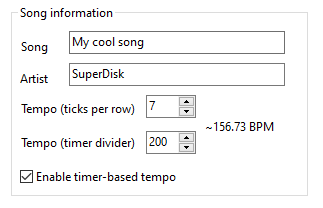Integration
Integrating hUGEDriver into your project depends on what you are using.
First, get the release of hUGEDriver that matches your version of hUGETracker.
RGBDS (assembly)
Import hUGEDriver.asm and hUGE.inc (in the include directory) into your project (songs need the latter as well).
You will additionally need hardware.inc 4.2 or later, if you don’t already.
Then, simply compile hUGEDriver.asm with the rest of your code, and you’re done!
GBDK (C)
hUGEDriver releases contain a pre-compiled .lib for use with GBDK-2020. Link it while compiling, include hUGEDriver.h, and you’re done:
lcc ... -Wl-lhUGEDriver.lib
If you want to compile the driver yourself, a few extra steps are necessary.
- You will need RGBDS, and Python
- Assemble hUGEDriver:
rgbasm -o hUGEDriver.obj hUGEDriver.asm - Convert the object file:
python tools\rgb2sdas.py -o hUGEDriver.o hUGEDriver.obj - Import
hUGEDriver.hinto your project - Simply link
hUGEDriver.owith the rest of your code, and you’re done!
Usage
There are two parts to using hUGEDriver: initializing a song, and playing a song.
Initialization
You begin playing a song by passing a pointer to it to the hUGE_init function.
How can you get such a pointer, though?
Simple!
The “song descriptor” that you choose when exporting your song names a label (assembly) / variable (C) that points to the song!
So if your song descriptor was, say, ryukenden:
| Assembly | C |
|---|---|
|
|
Playing
The function hUGE_dosound plays a single tick of the current song when called.
First and foremost, how often should that function be called? That actually depends on what the song expects!

If the song does not use “timer playback”, then hUGE_dosound must be called once per frame.
This is usually done either by calling it from your game’s main loop, or by calling it from your VBlank interrupt handler.
However, if the song does use timer playback, then you must set the timer registers appropriately (TODO), and call hUGE_dosound from the timer interrupt handler.
Using an interrupt handler exposes you to two additional constraints:
hUGE_dosoundmust not run in the middle ofhUGE_init.hUGE_dosoundmust not be called before the first call ever tohUGE_init.
Preferably, create a variable that you set to 0 on boot before calling hUGE_init, and to 1 after hUGE_init returns; in the interrupt handler, skip calling hUGE_dosound if the variable isn’t 0. An alternative is to disable interrupts (ASM: di+ei, GBDK: __critical) while you call hUGE_init.